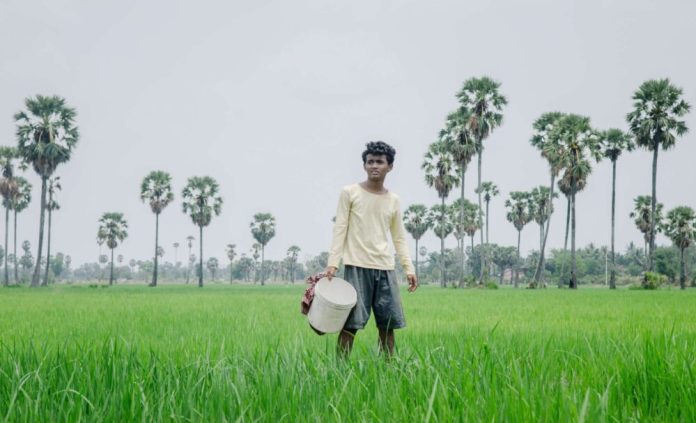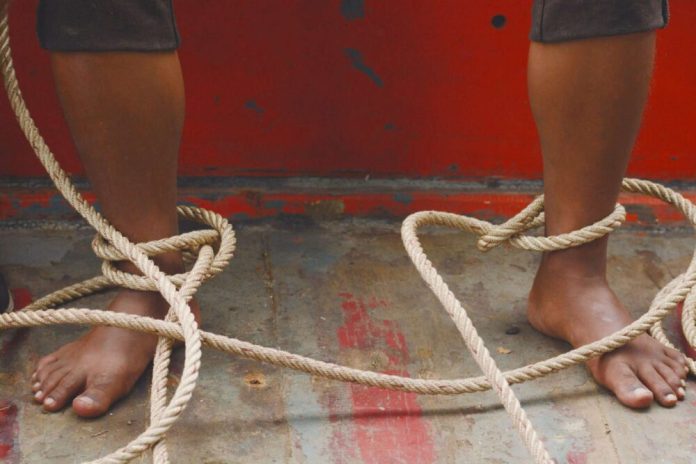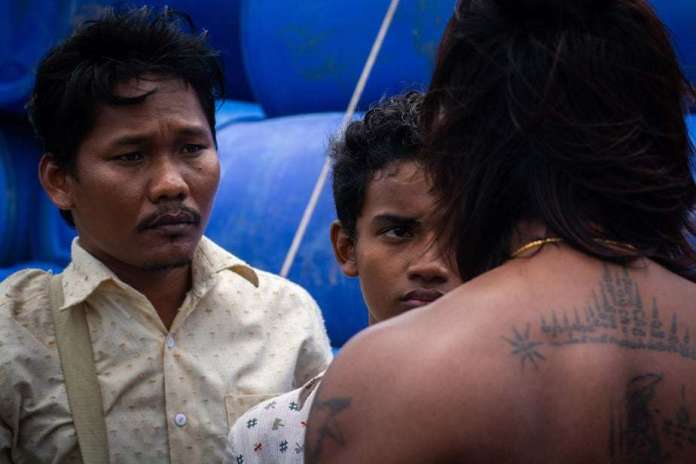The film “BUOYANCY – រសាត់អណ្តែត” was selected as film at Australian International Film Festival as the best film and won OSCARS Academy Awards on 2020 starting Cambodia on cinema from 18th of October 2019.
The film “BUOYANCY – រសាត់អណ្តែត” is supported by the Cambodia Film Commission (CFC), the film was the first premiere at Berlin, Germany and won the Prize of Ecumenical Jury and the Best GWFF – Feature Award Nomination 2019 *Amnesty and the critics top ten for Screen International and Sight & Sound. Won Audience Award Panorama 2019 and the film had its Australian premiere at the Melbourne on International Film Festival and is being released in Australian cinema on 26th of September.
 “BUOYANCY – រសាត់អណ្តែត” International Award Nomination 2019, The first premiere at International Film Festival in Melbourne and the film was Selected as number 5th film in MIFF Audience Award Winners * Special, Mention – Age Critics Jury Prize for Best Australian Film, The Asia Pacific Screen Awards, International Film Festival Cinefest Oz, Nominations for the ATOM Awards Best Fiction Feature Film, and official selected at the Chicago International Film Festival to screen on 26th of October 2019 and “BUOYANCY – រសាត់អណ្តែត” also official selected by the Cambodia International Film Festival for March 2020.
“BUOYANCY – រសាត់អណ្តែត” International Award Nomination 2019, The first premiere at International Film Festival in Melbourne and the film was Selected as number 5th film in MIFF Audience Award Winners * Special, Mention – Age Critics Jury Prize for Best Australian Film, The Asia Pacific Screen Awards, International Film Festival Cinefest Oz, Nominations for the ATOM Awards Best Fiction Feature Film, and official selected at the Chicago International Film Festival to screen on 26th of October 2019 and “BUOYANCY – រសាត់អណ្តែត” also official selected by the Cambodia International Film Festival for March 2020.
 “BUOYANCY – រសាត់អណ្តែត” showing about in rural Cambodia, spirited 14-year-old Chakra (Sarm Heng) works the rice fields with his family. He yearns for independence and seeks out a local broker who can get him paid work in a Thai factory. Without telling his family, Chakra travels to Bangkok to make his fortune.
“BUOYANCY – រសាត់អណ្តែត” showing about in rural Cambodia, spirited 14-year-old Chakra (Sarm Heng) works the rice fields with his family. He yearns for independence and seeks out a local broker who can get him paid work in a Thai factory. Without telling his family, Chakra travels to Bangkok to make his fortune.
 Chakra secretly journeys across the border and finally arrives in Thailand. But there he and his new friend Kea (33) (Ros Mony) realise the broker has lied to them. Both Chakra and Kea, along with other Cambodians and Burmese, are sold to a fishing captain as slaves.
Chakra secretly journeys across the border and finally arrives in Thailand. But there he and his new friend Kea (33) (Ros Mony) realise the broker has lied to them. Both Chakra and Kea, along with other Cambodians and Burmese, are sold to a fishing captain as slaves.
 They are trapped at sea indefinitely, trawling fish 22 hours a day, surviving on just a handful of cold rice. Captain Rom Ran (45) quickly weeds out those slaves weakened by the conditions or trying to escape, and throws them overboard. The trawler sells its catch and restocks its supplies without going to land, making escape impossible.
They are trapped at sea indefinitely, trawling fish 22 hours a day, surviving on just a handful of cold rice. Captain Rom Ran (45) quickly weeds out those slaves weakened by the conditions or trying to escape, and throws them overboard. The trawler sells its catch and restocks its supplies without going to land, making escape impossible.
 As fellow slaves are tortured and murdered around them, Kea begins to lose his mind. When his only ally is killed, Chakra looks to Rom Ran to understand what it will take to be free. With hope and humanity dwindling, Chakra decides to take control of the trawler.
As fellow slaves are tortured and murdered around them, Kea begins to lose his mind. When his only ally is killed, Chakra looks to Rom Ran to understand what it will take to be free. With hope and humanity dwindling, Chakra decides to take control of the trawler.
 The film “BUOYANCY – រសាត់អណ្តែត” is writer and director by Rodd Rathjen is an Australian Writer and Director raised in Colbinabbin in central Victoria. Rodd completed a Bachelor of Film and Television with Honours, from the Victorian College of the Arts. He made short film TAU SERU in India, which had its World Premiere at Cannes as part of Critics Week 2013. The film also won Best Australian Short at MIFF, screened at over 50 International festivals and received numerous awards. In 2014 Rodd received the Directors Acclaim Fund from Screen Australia and participated in the Berlinale Talent Campus as a Director. He was awarded Hot Shots funding and made short film SWEAT featuring Colin Friels, which had its World Premiere at MIFF 2015. BUOYANCY is his debut feature film.
The film “BUOYANCY – រសាត់អណ្តែត” is writer and director by Rodd Rathjen is an Australian Writer and Director raised in Colbinabbin in central Victoria. Rodd completed a Bachelor of Film and Television with Honours, from the Victorian College of the Arts. He made short film TAU SERU in India, which had its World Premiere at Cannes as part of Critics Week 2013. The film also won Best Australian Short at MIFF, screened at over 50 International festivals and received numerous awards. In 2014 Rodd received the Directors Acclaim Fund from Screen Australia and participated in the Berlinale Talent Campus as a Director. He was awarded Hot Shots funding and made short film SWEAT featuring Colin Friels, which had its World Premiere at MIFF 2015. BUOYANCY is his debut feature film.

 An estimated 200,000 men and boys are thought to be in slavery and forced labour in the fishing industry in South East Asia. It is an industry worth over $6 billion that supplies fish products to the world.
An estimated 200,000 men and boys are thought to be in slavery and forced labour in the fishing industry in South East Asia. It is an industry worth over $6 billion that supplies fish products to the world.
BUOYANCY is the first fictional feature film about the horrific real-life phenomenon of slavery on Thai fishing boats. Thailand’s fishing sector returned export earnings of $5.5bn in 2017, with half the estimated 600,000 men working in the industry from poverty-stricken countries such as Myanmar and Cambodia. They are trafficked and forcibly set to work on commercial fishing boats, which supply seafood products to consumers around the world.
 Every day approximately 60 boys leave Cambodia for Thailand thinking they are going to work in a factory and send money home to their families. Less than 5 of them return. Human Rights Watch conducted interviews with 248 current and former Burmese and Cambodian fishermen as well as Thai officials, boat owners, local activists and United Nations agency staff over a two-year period in all of Thailand’s major fishing ports.
Every day approximately 60 boys leave Cambodia for Thailand thinking they are going to work in a factory and send money home to their families. Less than 5 of them return. Human Rights Watch conducted interviews with 248 current and former Burmese and Cambodian fishermen as well as Thai officials, boat owners, local activists and United Nations agency staff over a two-year period in all of Thailand’s major fishing ports.
 They reported that “Forced labour is routine, The workers we interviewed described being trafficked onto ships, trapped in jobs they couldn’t leave, physical abuse, lack of food, long hours and awful working conditions. The worst thing for many of them was not being paid – the psychological harm and final indignity was the hardest to bear.”
They reported that “Forced labour is routine, The workers we interviewed described being trafficked onto ships, trapped in jobs they couldn’t leave, physical abuse, lack of food, long hours and awful working conditions. The worst thing for many of them was not being paid – the psychological harm and final indignity was the hardest to bear.”
Photo by: Supplied














